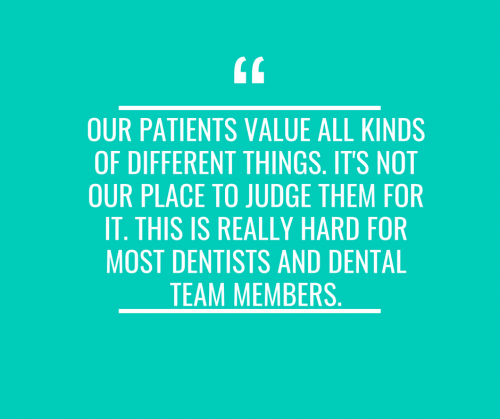Meet Them or Bring Them
I’ve been told ever since dental school that if I just use the right words I can get any patient to accept any treatment. At the very core of this narrative is that patients can afford the treatment that we propose, but they choose not to. They’d prefer to buy cell phones, new cars and cable. But if we’re good enough (and if we take their course) we can motivate them to forgo these luxuries for the glories of comprehensive dental care.
It never seems to occur to those folks that the value that we put on complete dental health is a value judgement that patient may not share. I’ll go even further and say that it’s O.K. if patients don’t value their teeth. Because I’d much rather work on a patient that already values having healthy teeth and gums than one I’ve convinced that they should value it. Perhaps the one I’ve talked into receiving my valued service is the one who’s more likely to have buyers remorse.
I have a friend that is really good at case presentation. He takes lots of photos, fully mounted study models and CT scans. Often he’ll have the photos digitally enhanced to let the patient know what his proposed treatment might look like. He does big cases. Lots of them. The kind of cases that much of dental continuing education explains that we should be aspiring to. He’s a very skilled and conscientious dentist.
Recently, he was sanctioned by his state board for supposed record keeping violations. How do you think the board found these “egregious” errors? Was the patient unhappy with the quality of the dentistry done? No. In fact, the patient had no complaints about the dentistry. It was just that she felt like she had paid enough for the work that was done and was “confused” about how much the treatment was going to cost.
 I’m positive that my friend had the patient’s best interests at heart. He knows how to deliver some amazing care. I think he persuaded her why she should value the kind of care he wanted to deliver to her without her actually valuing the care.
I’m positive that my friend had the patient’s best interests at heart. He knows how to deliver some amazing care. I think he persuaded her why she should value the kind of care he wanted to deliver to her without her actually valuing the care.
Our patients value all kinds of different things. It’s not our place to judge them for it. This is really hard for most dentists and dental team members. Everyone has heard a patient explain that they don’t want to spend the money on this tooth and soon after they talk about their upcoming trip to Mexico. This drives dentists crazy. “If they only valued their teeth the way they value their vacation” we think. We judge their priorities and what they value. It’s obvious to us that they should prefer more optimal dental treatment over a stupid trip to Mexico.
I have to admit that I’m guilty as charged.
But it drives us crazy when someone judges our values and priorities. If you’ve ever gotten annoyed with someone talking about “rich dentists” then you’ve been a victim of this. We valued going to school for a long time and taking the risk of starting a business and we feel like it’s fair that we reap the rewards. But from the standpoint of some, we’re just “rich dentists.”
Can we possibly admit that valuing a long anticipated vacation to Mexico over placing that implant is O.K.? Perhaps one person’s “optimal dental health” is quite a bit different than what we dentists think of as optimal and that’s alright.
We need to educate patients about their condition separately from whatever treatment plan we might be proposing. That’s part of being a doctor. And part of getting true informed consent. The patient has autonomy and always should. Your superior skills of persuasion aside, the patient has a right to their own messed up teeth if that’s what they prefer.
I don’t want to come off like I’m not in favor of the concept of “comprehensive dentistry.” But I don’t think that paradigm is a good fit for everyone. In fact it’s probably not a great fit for a majority of people that might walk in your door. Some folks need a full mouth rehab but will only choose to have the painful tooth removed.
As a dentist you need to know a lot of things, but one very important skill is being able to meet the patient where they are. After all, patient values can change over time and being the one that helped them when they weren’t interested in much treatment can help you be the dentist they find when they are interested in more and potentially better treatment.
Letting people know what you’re seeing and explaining what you can do for them is our duty. Persuading people that the way they value dental care is wrong is a recipe for disaster and short circuits the patient’s autonomy.


